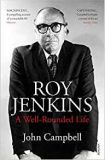Roy Jenkins: A Well-Rounded Life by John Campbell
| Roy Jenkins: A Well-Rounded Life by John Campbell | |
|
| |
| Category: Biography | |
| Reviewer: John Van der Kiste | |
| Summary: A very full biography of the former Labour minister and SDP leader | |
| Buy? Yes | Borrow? Yes |
| Pages: 818 | Date: March 2014 |
| Publisher: Jonathan Cape | |
| ISBN: 9780224087506 | |
|
| |
It must be rare indeed that a British political figure who never became Prime Minister is the subject of or deserves a biography comprising 750 pages of text. However, as John Campbell demonstrates in this volume, it is difficult to do justice to the life, times and career of Roy Jenkins in much less than that.
The author is honest in his bias towards the man. Having grown up as a near-neighbour of the Jenkins family, and having been ‘an enthusiastic foot-soldier for the SDP’ in its formative days, he confesses in his introduction to being a strong supporter of merger with the Liberals in the 1980s and never seeing eye to eye with the openly independent-minded Dr David Owen.
He then takes us through a painstakingly-researched life, of the only child of a Welsh miner and a mother who shamelessly pampered him, and then the man who enjoyed an Oxford education where he was a friend and associate of Tony Crosland (with whom he enjoyed an occasionally intimate love-hate relationship for some years), Edward Heath, and Denis Healey. Being a compulsive reader, writer and reviewer, it is apparent that had he not gone into politics, he would be remembered as a prolific biographer of Churchill, Gladstone and others, and tireless journalist. One of his earliest works, ‘Mr Balfour’s Poodle’, about the Edwardian political crisis, was allegedly placed by some booksellers in the section on pets. Even when the husband and father of three went on holiday, he generally had a book in hand, worked for part of every day, and believed that ‘a holiday without any work is as barren as a working day without a conversational meal’. Workaholics are not always good family men, and it is admitted that he was a somewhat distant father, more like a favourite uncle – as well as a somewhat unfaithful husband, although discretion was always maintained.
As a politician he was something of an enigma. Although for part of his career he was tipped as a potential Labour leader, some of his fellow party members always doubted the claret-lover’s commitment to socialism, suspecting he was a Liberal in sheep’s clothing. A wholehearted reformer as a Home Secretary, responsible for much liberalising legislation during the swinging sixties and the bane of moralising traditionalists like Mary Whitehouse in his maxim that the permissive society was the civilised society, he was also seen as very right-wing Labour on certain issues. His relationship with Harold Wilson tended to blow hot and cold, and he was believed to be something of a magnet to those who felt in 1968 that the only way to save the Labour government was to oust their temporarily embattled leader. But others doubted whether their relaxed Home Secretary really wanted to be Prime Minister, and his colleague Barbara Castle thought him an observer of politics rather than a practitioner.
From around 1970 onwards, his career was to be dominated by two objectives; one, to support those, even his political adversary Heath, who were intent on taking Britain into wholehearted membership of Europe, and the other, to break the mould of British politics. His chequered path, as a man who failed to seize the moment as a Prime Minister in the making, as a President of the European Commission, and then as the centre party standard bearer who played for high stakes after leading the Labour party, was more or less unique. In a lengthy book packed with interesting episodes, it is safe if perhaps unnecessary to say that the chapters dealing with the formation of the Social Democratic Party and Alliance, and his relations with the rest of the ‘Gang of Four’ – Shirley Williams, William Rodgers, and David Owen – as well as Liberal leader David Steel, are the most fascinating of all.
Campbell is full of praise for the man who had the courage of his convictions and was often manoeuvred into making difficult decisions, particularly at a time when his health was not good. At the same time he takes a measured view of his pro-Europeanism, acknowledging that with regard to the eurozone, in retrospect he should bear some of the blame ‘for foisting a flawed vision on the continent before it was ready’.
In retirement, after losing his third seat at Westminster, Glasgow Hillhead, he took some pride in having represented the three great cities at one time or another – Glasgow, London (Southwark) and Birmingham (Stechford). It is also noted that in quarter of a century as the member for the last-named, he never saw the need to buy a house in the constituency, it being an age when such things were not necessarily expected. However his parliamentary career probably ended at the right time. When he returned to the green benches in 1982 after an absence of five years, he was dismayed at how much the House of Commons had deteriorated in the meantime, with the age of set-piece debates having been partially superseded by the cheap point-scoring of Prime Minister’s Question Time.
Posterity’s verdict on Jenkins is a mixed balance sheet. Should he be remembered as a trail-blazing reformer as minister, or as a class traitor whose pursuit of ambition divided the left-of-centre during the 1980s and thus handed the country Thatcherism on a plate – and in the long term helped make his old party electable once more? Perhaps it is too soon to judge. But this is a very thorough biography, adulatory without being sympathetic, and admirably impartial, occasionally critical in turn. For any reader with an interest in post-war politics, this is very highly recommended.
For further reading on the subject, may we also recommend Downing Street Diary: Volume Two by Bernard Donoughue and When the Lights Went Out: Britain in the Seventies by Andy Beckett, or for a more general view of the age, A History of Modern Britain by Andrew Marr
Please share on: ![]() Facebook,
Facebook, ![]() Twitter and
Twitter and
![]() Instagram
Instagram
![]() You can read more book reviews or buy Roy Jenkins: A Well-Rounded Life by John Campbell at Amazon.co.uk Amazon currently charges £2.99 for standard delivery for orders under £20, over which delivery is free.
You can read more book reviews or buy Roy Jenkins: A Well-Rounded Life by John Campbell at Amazon.co.uk Amazon currently charges £2.99 for standard delivery for orders under £20, over which delivery is free.
![]() You can read more book reviews or buy Roy Jenkins: A Well-Rounded Life by John Campbell at Amazon.com.
You can read more book reviews or buy Roy Jenkins: A Well-Rounded Life by John Campbell at Amazon.com.
Comments
Like to comment on this review?
Just send us an email and we'll put the best up on the site.


